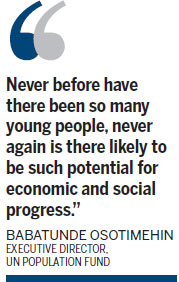UN: Young people can transform the future
The number of young people in the world has reached a new peak, and this could bring unprecedented economic gains, the United Nations Population Fund said on Tuesday.
There are now 1.8 billion people aged between 10 and 24, out of a total global population of more than 7.2 billion.
Introducing policies that empower young people to drive economic and social development and boost per capita income could yield a "demographic dividend", the agency said in a report called The State of the World Population 2014.
The dividend in sub-Saharan Africa alone could amount to as much as $500 billion a year for 30 years, echoing the experience resulting from policies implemented in East Asian nations during the 1950s and 1960s.
The agency said several East Asian economies expanded access to voluntary family planning, enabling individuals to start families later and have fewer children, leading to unprecedented economic growth.
"Never before have there been so many young people, never again is there likely to be such potential for economic and social progress," Babatunde Osotimehin, the agency's executive director, said at the launch of the report.

Young people "present an enormous opportunity to transform the future", he said.
"Young people are the innovators, creators, builders and leaders of the future. But they can transform the future only if they have skills, health, decision-making and real choices in life.
"Education is critical. Investment in health, including sexual and reproductive health, are also central. When young people can make a healthy transition from adolescence into adulthood, options expand for the future."
He called for a strengthening of the rule of law and security institutions to protect the rights of all, including young people.
"With the right policies and investment, countries can realize a 'demographic dividend' made possible by falling mortality and fertility rates," the executive director said. "With a larger working population and fewer dependents, a country has a one-time opportunity for rapid economic growth and stability.
"Investments are needed to build institutional capacity, strengthen human capital, pursue economic models that improve employment prospects and promote inclusive governance and the enjoyment of human rights.
"International support can unlock the potential of the next generation of innovators, entrepreneurs, change agents and leaders."
He said young people should be at the center of the post-2015 vision for sustainable development. The Millennium Development Goals are due to be reached by next year.
Asked in a MYWorld2015 poll about their post-2015 priorities, 597,000 young people aged between 10 and 24 put education first, according to the agency.
"Tens of millions do not go to school, or if they do, they miss even minimum benchmarks for learning," the report said.
"Employment prospects are often dismal, with jobs unavailable or poor in quality, leading to a worsening global youth unemployment crisis.
"Up to 60 percent of young people in developing regions are not working or in school, or have only irregular employment."
(China Daily 11/20/2014 page11)












